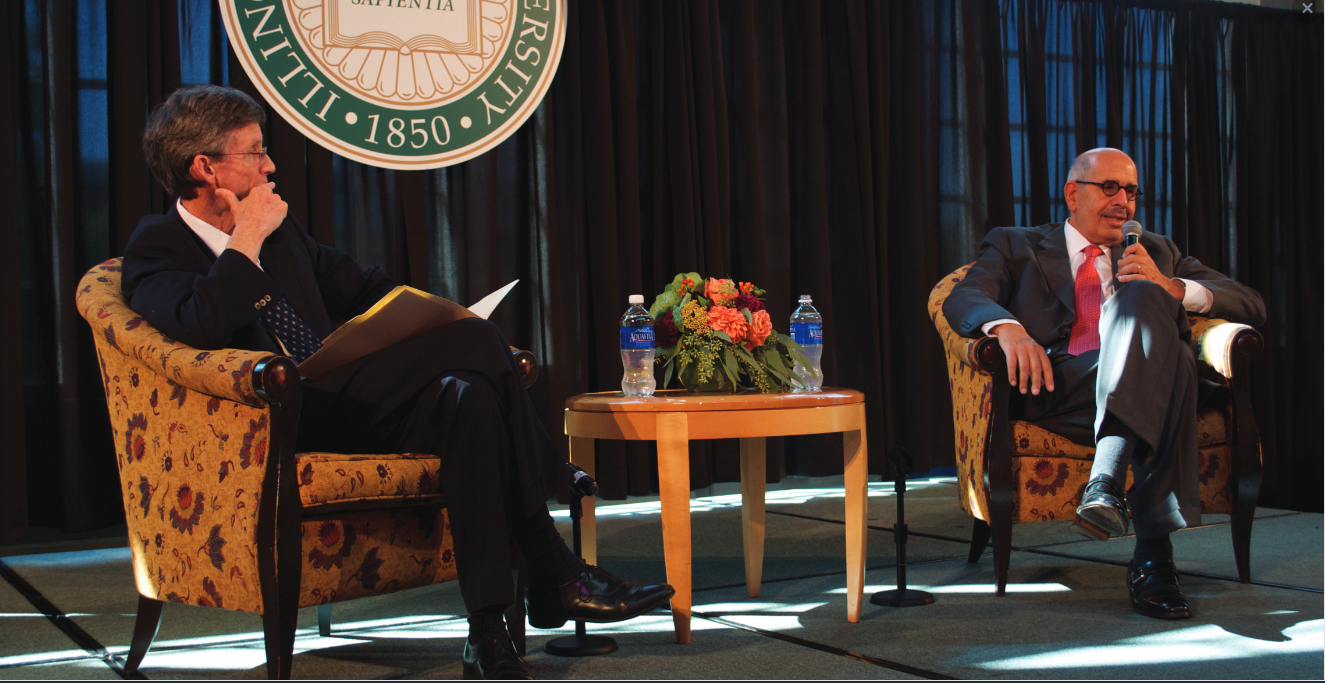Jeff Neukom, Managing Editor
Nobel Peace Prize winners don’t frequently visit Illinois Wesleyan University. It’s less frequent that they challenge students, professors and staff to reconsider conceptions they’d regarded as truth.
Approximately 100 people were in attendance for the Adlai E. Stevenson Memorial’s 50th anniversary masterclass, held in the Hansen Student Center. William Monroe, an integral member of the John and Erma Stutzman Peace Fellows Program, served as host for the event, helping launch this year’s discussion.
The Stevenson Lecture Series is an annual memorial to Adlai Stevenson, a Bloomington native who served as the Chief U.S. Delegate to the United Nations. IWU and Illinois State University co-host the event, which means that next year’s masterclass will be at ISU and IWU will host the full talk.
On Wednesday, Sept. 30 Nobel Peace Prize winner Mohamed ElBaradei posed several tough questions. Much of his talk centered on the topic of diplomacy in the Middle East, which is a touchy subject for many.
ElBaradei contested the theory of legitimation, which he said has been a significant factor in delaying talks regarding the Iran Deal. Essentially, the crux of this theory is that by engaging in talks with certain groups in the Middle East, we acknowledge their philosophies or customs as acceptable practice. ElBaradei said, in short, that this notion was “bonkers.”
He encouraged the audience members to set aside biases and initiate real, genuine dialogue. “We are all the same family, and we have to find the formula to live together,” he said. “We are part of the human family.”
His challenges come at a time when concerns about Islamophobia and xenophobia are raised frequently. ElBaradei pointed to a certain divide between the Eastern and Western cultures, encouraging us to look beyond differences in race and religion. “We’re all on a journey to see what we can do to have a decent life. We have the same hopes, the same aspirations.”
“We have to ask ourselves: ‘Why are people looking for nuclear weapons?’” he said. “Why is a person ready to take the risk of sacrificing his life? How come we ended up in that situation?”
ElBaradei examined the complex diplomatic situation in the Middle East, emphasizing the importance of dialogue and the futility of what he called “empty rhetoric.”
“How do we deal with that environment so that we do not have another ISIL in five years? How come in the same world we have Mother Teresa and a suicide bomber? Why?” he said. “We need to work together and find a way. We have to work on our shared humanity. It’s not an ethical issue; it’s simply a question of survival right now.”
First-year Laura Bullock was the first of several audience members to speak with ElBaradei. “Egypt is one of the more stable countries to emerge from the Arab Spring by far, so I was curious as to what one of its former leaders would think about its future as a stabilizer to such a turbulent area,” she said.
Bullock expressed disappointment with how ElBaradei treated her questions and those of others. “It’s a shame my question wasn’t really answered, but at least I got the chance to ask about it,” she said. “His viewpoint is admirable, but Mr. ElBaradei’s steadfast avoidance of giving concrete answers to legitimate questions squashed any fuzzy optimism.”
“The great enemies of man are poverty, war, and oppression,” ElBaradei said. “The most important lesson to learn as an adult is to compromise. You don’t compromise your principles, but the details. You compromise on what you’re looking for.”

